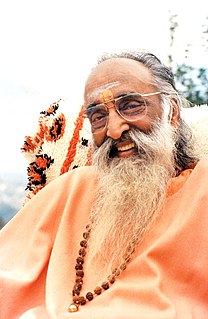A Quote by Ramakrishna
Right discrimination is of two kinds analytical and synthetical. The first leads one from the phenomena to the Absolute Brahman, while by the second one knows how the Absolute Brahman appears as the universe.
Related Quotes
Where will you go to seek Brahman? He is immanent in all beings. Here, here is the visible Brahman! Shame on those who, neglecting the visible Brahman, set their minds on other things! Here is the visible Brahman before you as tangible as a fruit in one's hand! Can't you see? Here - here - is Brahman!
Always remember deep in your heart that all is well and everything is unfolding as it should. There are no mistakes anywhere, at any time. What appears to be wrong is simply your own false imagination. That's all. But we live in a universe of Brahman, of Absolute Reality, self -contained Consciousness, where there's perfection, perfect life, perfect bliss, perfect being. That perfection knows nothing about wrong and right, good and bad, happy and sad. It knows only itself as Perfection. And you are That.
What Brahman is cannot be described. All things in the world — the Vedas, the Puranas, the Tantras, the six systems of philosophy — have been defiled, like food that has been touched by the tongue, for they have been read or uttered by the tongue. Only one thing has not been defiled in this way, and that is Brahman. No one has ever been able to say what Brahman is.
The rishis of old attained the Knowledge of Brahman. One cannot have this so long as there is the slightest trace of worldliness. How hard the rishis laboured ! Early in the morning they would go away from the hermitage, and would spend the whole day in solitude, meditating on Brahman. At night they would return to the hermitage and eat a little fruit or roots. They kept their mind aloof from the objects of sight, hearing, touch, and other things of a worldly nature. Only thus did they realize Brahman as their own inner conciousness.
The Perennial Philosophy is expressed most succinctly in the Sanskrit formula, tat tvam asi ('That art thou'); the Atman, or immanent eternal Self, is one with Brahman, the Absolute Principle of all existence; and the last end of every human being, is to discover the fact for himself, to find out who he really is.
Faith exists when absolute confidence in that which we cannot see combines with action that is in absolute conformity to the will of our Heavenly Father. Without all three--first, absolute confidence; second, action; and third, absolute conformity--without these three all we have is a counterfeit, a weak and watered-down faith.
There are similarities between absolute power and absolute faith: a demand for absolute obedience, a readiness to attempt the impossible, a bias for simple solutionsto cut the knot rather than unravel it, the viewing of compromise as surrender. Both absolute power and absolute faith are instruments of dehumanization. Hence, absolute faith corrupts as absolutely as absolute power.
Even those who have desired to work out a completely positive philosophy have been philosophers only to the extent that, at the same time, they have refused the right to install themselves in absolute knowledge. They taught not this knowledge, but its becoming in us, not the absolute but, at most, our absolute relation to it, as Kierkegaard said. What makes a philosopher is the movement which leads back without ceasing from knowledge to ignorance, from ignorance to knowledge, and a kind of rest in this movement.



































